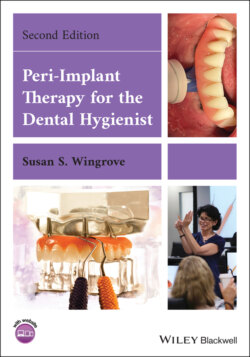Читать книгу Peri-Implant Therapy for the Dental Hygienist - Susan S. Wingrove - Страница 26
Oral‐systemic health link to overall health
ОглавлениеIt is now widely accepted and confirmed through research that there is an oral systemic connection. A link established between bacterial infections, oral bacterial biofilm, and cytokine release in periodontal tissues. The link between oral infection and certain systemic diseases has taken center stage, and inflammation is the key!
Who better to identify inflammation than hygienists who evaluate for potential periodontal disease on a daily basis? Periodontal disease is one of the major inflammatory diseases in the body. Dental professionals, therefore, hold a key role now, not only in the treatment of periodontal disease and peri‐implant disease but also in comprehensive disease management.
Periodontal medicine is now the coined term that looks at the risk for certain systemic diseases that is increased by an oral infection (i.e., periodontal and peri‐implant disease) from patients’ inflammatory response to infection. To fully understand the severity of the problem, a basic knowledge of how bacteria from the periodontal or peri‐implant sulcus gains access to the systemic circulation (i.e., blood stream) is important.
The bacterial biofilm comes in contact with ulcerated epithelium, which creates a pathway directly to the systemic circulation. Gram‐negative bacteria, which are always present in the oral cavity, have access to the blood vessels, which allows the infection to reach other tissues and organs throughout the body. Periodontal and/or peri‐implant disease act as a reservoir of pro‐inflammatory mediators or modules that enhance the inflammatory response. They enter the systemic circulation and can induce and/or perpetuate systemic effects that can ultimately affect the overall health of the patient (see Figure 2.1).
There are four major diseases with proven links to periodontal disease and are by association considered risk factors for peri‐implant disease: cardiovascular/cerebrovascular disease, preterm birth/low birth weight, diabetes , and respiratory disease ; see Box 2.1.
Figure 2.1 Inflammation process.
